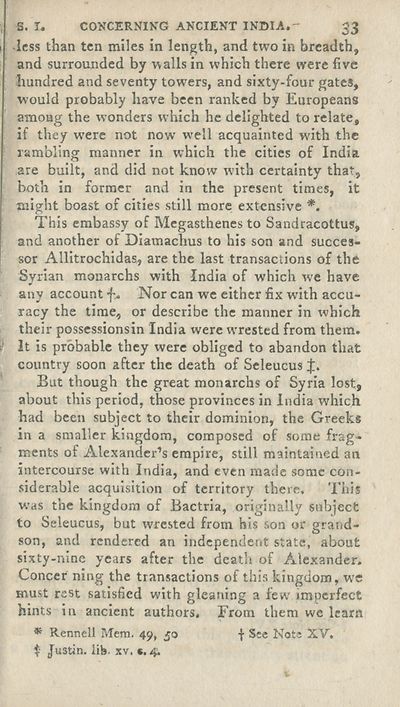Occupations > Historical disquisition concerning the knowledge which the ancients had of India; and the progress of trade with that country
(47)
Download files
Complete book:
Individual page:
Thumbnail gallery: Grid view | List view

S. U CONCERNING ANCIENT INDIA. 33
-less than ten miles in length, and two in breadth,
and surrounded by walls in which there were five
hundred and seventy towers, and sixty-four gates,
would probably have been ranked by Europeans
among the wonders which he delighted to relate,
if they wrere not now well acquainted with the
rambling manner in which the cities of India
are built, and did not know with certainty that,
both in former and in the present times, it
might boast of cities still more extensive *.
This embassy of Megasthenes to Sandracottus,
and another of Diamachus to his son and succes¬
sor Allitrochidas, are the last transactions of the
Syrian mouarchs with India of which we have
any account f- Nor can we either fix with accu¬
racy the time, or describe the manner in which
their possessionsin India were wrested from them.
It is probable they were obliged to abandon that
country soon after the death of Seleucus J.
But though the great monarchs of Syria lost,
about this period, those provinces in India which
had been subject to their dominion, the Greeks
in a smaller kingdom, composed of some frag¬
ments of Alexander’s empire, still maintained an
intercourse with India, and even made some con-
siderable acquisition of territory there. This
was the kingdom of Bactria, originally subject
to Seleucus, but wrested from his son or grand¬
son, and rendered an independent state, about
sixty-nine years after the death of Alexander.
Concer ning the transactions of this kingdom, we
must rest satisfied with gleaning a few imperfect
hints in ancient authors. From them we learn
* Rennell Mem. 49, 50 f See Note XV.
t Justin, lib. xv. c. 4.
-less than ten miles in length, and two in breadth,
and surrounded by walls in which there were five
hundred and seventy towers, and sixty-four gates,
would probably have been ranked by Europeans
among the wonders which he delighted to relate,
if they wrere not now well acquainted with the
rambling manner in which the cities of India
are built, and did not know with certainty that,
both in former and in the present times, it
might boast of cities still more extensive *.
This embassy of Megasthenes to Sandracottus,
and another of Diamachus to his son and succes¬
sor Allitrochidas, are the last transactions of the
Syrian mouarchs with India of which we have
any account f- Nor can we either fix with accu¬
racy the time, or describe the manner in which
their possessionsin India were wrested from them.
It is probable they were obliged to abandon that
country soon after the death of Seleucus J.
But though the great monarchs of Syria lost,
about this period, those provinces in India which
had been subject to their dominion, the Greeks
in a smaller kingdom, composed of some frag¬
ments of Alexander’s empire, still maintained an
intercourse with India, and even made some con-
siderable acquisition of territory there. This
was the kingdom of Bactria, originally subject
to Seleucus, but wrested from his son or grand¬
son, and rendered an independent state, about
sixty-nine years after the death of Alexander.
Concer ning the transactions of this kingdom, we
must rest satisfied with gleaning a few imperfect
hints in ancient authors. From them we learn
* Rennell Mem. 49, 50 f See Note XV.
t Justin, lib. xv. c. 4.
Set display mode to:
![]() Universal Viewer |
Universal Viewer | ![]() Mirador |
Large image | Transcription
Mirador |
Large image | Transcription
| Antiquarian books of Scotland > Occupations > Historical disquisition concerning the knowledge which the ancients had of India; and the progress of trade with that country > (47) |
|---|
| Permanent URL | https://digital.nls.uk/125576337 |
|---|
| Description | Thousands of printed books from the Antiquarian Books of Scotland collection which dates from 1641 to the 1980s. The collection consists of 14,800 books which were published in Scotland or have a Scottish connection, e.g. through the author, printer or owner. Subjects covered include sport, education, diseases, adventure, occupations, Jacobites, politics and religion. Among the 29 languages represented are English, Gaelic, Italian, French, Russian and Swedish. |
|---|

